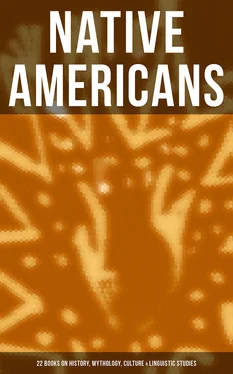Table of Contents
With the exception of these questions and complications arising out of the construction of the various articles of the treaty of July 19, 1866, nothing of an important character has occurred in connection with the official relations between the Cherokee Nation and the Federal Government since the date of that treaty.
Their history has been an eventful one. For two hundred years a contest involving their very existence as a people has been maintained against the unscrupulous rapacity of Anglo-Saxon civilization. By degrees they were driven from their ancestral domain to an unknown and inhospitable region. The country of their fathers was peculiarly dear to them. It embraced the head springs of many of the most important streams of the country. From the summit of their own Blue Ridge they could watch the tiny rivulets on either side of them dashing and bounding over their rocky beds in their eagerness to join and swell the ever increasing volume of waters rolling toward the Atlantic Ocean or the Gulf of Mexico: the Tennessee and the Cumberland, the Kanawha and the Kentucky, the Peedee and the Santee, the Savannah and the Altamaha, the Chattahoochee and the Alabama, all found their beginnings within the Cherokee domain. The bracing and invigorating atmosphere of their mountains was wafted to the valleys and low lands of their more distant borders, tempering the heat and destroying the malaria. Much of their country was a succession of grand mountains, clothed with dense forests; of beautiful but narrow valleys, and extensive well watered plains. Every nook and corner of this vast territory was endeared to them by some incident of hunter, warrior, or domestic life. Over these hills and through the recesses of the dark forests the Cherokee hunter had from time immemorial pursued the deer, elk, and buffalo. Through and over them he had passed on his long and vengeful journeys against the hated Iroquois and Shawnee.
The blood of his ancestors, as well as of his enemies, could be trailed from the Hiwassee to the Ohio. The trophies of his skill and valor adorned the sides of his wigwam and furnished the theme for his boastful oratory and song around the council fire and at the dance. His wants were few and purely of a physical nature. His life was devoted to the work of securing a sufficiency of food and the punishment of his enemies. His reputation among his fellow men was proportioned to the skill with which he could draw the bow, his cleverness and agility in their simple athletic sports, or the keen and tireless manner that characterized his pursuit of an enemy's trail. His life was simple, his wants were easily supplied; and, in consequence, the largest measure of his existence was spent in indolence and frivolous amusements. Such proportion of the family food as the chase did not supply was found in the cultivation of Indian corn. The pride of a warrior scorned the performance of menial labor, and to the squaw was this drudgery, as well as that of the household, assigned. His general character has been much misunderstood and misrepresented. He was in fact possessed of great ingenuity, keen wit, and rare cunning. In the consideration of matters of public importance, his conduct was characterized by a grave dignity that was frequently almost ludicrous. The studied stolidity of his countenance gave the spectator no clew to the inward bent of his feelings or determination. The anxious prisoner, from a watchful study of his face and actions, could read nothing of his probable fate. He was physically brave, and would without hesitancy attack the most dangerous beasts of the forests or his still more ferocious human enemies. In the hands of those enemies he would endure, with the most unflinching nerve, the cruelest tortures their ingenuity could devise, and at the same time chant his death song in the recital of his numerous personal acts of triumph over them.
His methods of warfare were, however, very different from those which meet the approval of civilized nations. He could not understand that there was anything of merit in meeting his antagonist in the open field, where the chances of victory were nearly equal. It was a useless risk of his life, even though his numbers exceeded those of his enemy, to allow them to become advised of his approach. His movements were stealthy, and his blows fell at an unexpected moment from the hidden ambush or in the dead hours of the night. His nature was cruel, and in the excitement of battle that cruelty was clothed in the most terrible forms. He was in the highest degree vindictive, and his memory never lost sight of a personal injury. He was inclined to be credulous until once deceived, after which nothing could remove his jealous distrust.
His confidence once fully secured, however, the unselfishness of his friendship as a rule would put to shame that of his more civilized Anglo-Saxon brother. His scrupulous honor in the payment of a just debt was of a character not always emulated among commercial nations. His noble qualities have not been granted the general recognition they deserve, and his ignoble traits have oftentimes been glossed over with the varnish of an unhealthy sentimentality. 688
For many years following his first contact with the whites the daily life of the Cherokee underwent but little change. The remoteness of his villages from the coast settlements and the intervening territory of other tribes limited in large degree any frequency of association with his white neighbors. In spite of this restricted intercourse, however, the superior comforts and luxuries of civilization were early apparent to him. His new-found desires met with a ready supply through the enterprising cupidity of the fur traders. At the same time and through the same means he was brought to a knowledge of the uses and comforts of calico and blankets, and the devastating though seductive influence of spirituous liquors. Yet nothing occurred to mar the peace hitherto existing with his white neighbors until their continued spread and seemingly insatiate demand for more territory aroused a feeling of jealous fear in his bosom. This awakening to the perils of his situation was, unfortunately for him, too late. The strength of the invaders already surpassed his own, and henceforth it was but a struggle against fate. Prior to the close of the Revolutionary war but little, if anything, had been done toward encouraging the Cherokee to adopt the customs and pursuits of civilized life. His native forests and streams had afforded him a sufficiency of flesh, fish, and skins to supply all his reasonable wants. Immediately upon the establishment of American Independence the policy to be pursued by the Government in its relations with the Indian tribes became the subject of grave consideration. The necessity began to be apparent of teaching the proximate tribes to cultivate the soil as a substitute for the livelihood hitherto gained through the now rapidly diminishing supplies of game. In the report of the commissioners appointed to negotiate the treaty of 1785, being the first treaty concluded between the Cherokees and the United States, they remark that some compensation should be made to the Indians for certain of their lands unlawfully taken possession of by the whites, and that the sum so raised should be appropriated to the purpose of teaching them useful branches of mechanics. Furthermore, that some of their women had lately learned to spin, and many others were "very desirous that some method should be fallen on to teach them to raise flax, cotton, and wool, as well as to spin and weave it."
Six years later, in the conclusion of the second treaty with them, it was agreed, in order "that the Cherokee Nation may be led to a greater degree of civilization, and to become herdsmen and cultivators instead of remaining in a state of hunters, the United States will from time to time furnish gratuitously the said nation with useful implements of husbandry." From this time forward the progress of the Cherokees in civilization and enlightenment was rapid and continuous. 689They had made such advancement that, nearly thirty years later, 690Return J. Meigs, their long time agent and friend, represented to the Secretary of War that such Government assistance was no longer necessary or desirable; that the Cherokees were perfectly competent to take care of themselves, and that further contributions to their support only had a tendency to encourage idleness and dependence upon the Government.
Читать дальше












